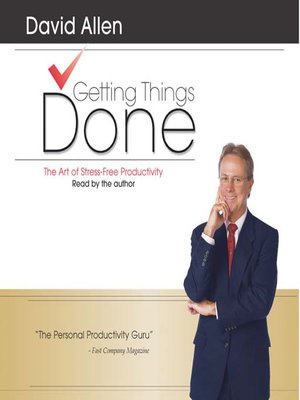
It’s normal to be human, it’s okay to feel down, and it’s inevitable that you won’t be productive all the time, but remember not to let one failure throw you completely off track. This does not help you when it comes to being productive and it can make things worse,” says Sullivan. “Letting the smallest setback affect your mood can be a really tough thing to get out of. Playing the long game is important in the face of setbacks, and it will make a difference in terms of how many things you get done. “People who develop a mindset of completion accept that they may not feel like doing what needs to be done, and do their tasks anyway, on time, because they have clarity of purpose on why they need to get them done,” she says. Learn to take pleasure in tasks being completed because they bring you closer to the vision you are aiming for (your why). Do it even if you don’t feel like itĭon’t feel like doing a task? Do it anyway, says Amlin.
#All things done inc driver#
When people know why their role is important to the overall vision, they feel an urgency to get things done,” according to Karen Amlin, a certified professional coach specializing in intentional thinking, leadership, communication, mindset, purpose-driven decisions, and follow-through.īeing connected to your why helps you become and stay intentional about your daily thoughts and actions, a huge driver to getting things done on a regular basis. I have coached CEOs and leaders of many industries on the importance of engaging their people in the vision and mission of their corporations.

“Being intentional and purpose-driven is the mindset that pushes people through tasks and goals they may otherwise put off. People with a “getting things done” attitude understand this more than anyone else, and that’s how they’re able to get more out of a regular workday than the average person. “Everyone gets a huge productivity boost simply by doing their difficult work at the right time of the day for them, and not wasting the most productive parts of their day with things like meetings, emails, and other admin work,” says Jank. Getting things done requires time and energy, so time- and energy management are crucial. Sullivan suggests focusing on one task at a time – this prevents the Zeigarnik effect from affecting your productivity, which is the feeling of overwhelm that uncompleted tasks can create.įostering an environment conducive to deep focus can also lead you to enter a flow state – the gateway to getting things done in a way that also feels fun and motivating. Jank recommends turning off notifications while working on mentally taxing projects. But you’ll also want to be extra-focused on those high-priority tasks. Once you’re ruthless about prioritizing, you’ll have more focus. People need to prioritize and work only on the things that move themselves/their career/their business forward.

Jennifer Jank, a productivity expert who helps high-growth teams hack their brains for better performance, says that in order to be productive, it’s important to get the right things done before anything: “Being busy is not the same as being productive. But since that’s not always the case, here are a few guiding principles to help you become the kind of professional who gets things done. If getting things done was easy, productivity would be a given. “This is why we must adopt a ‘getting things done’ attitude so we can stay on top of our work and ensure we are able to adapt to any changes.”

Companies are constantly changing, which means we must adapt quickly and learn new things that can affect our productivity in the workplace,” says Jim Sullivan, CEO & Founder of JCSI, a project-based recruitment solution. “With so many unexpected changes in work policy and technology, it can be tough to always remain diligent and get our work done. In the age of busywork and fast-paced pivots, a team that gets things done will always thrive – even when there are unknowns and bumps in the road. Having a “ getting things done” mindset trumps fancy business certifications.


 0 kommentar(er)
0 kommentar(er)
